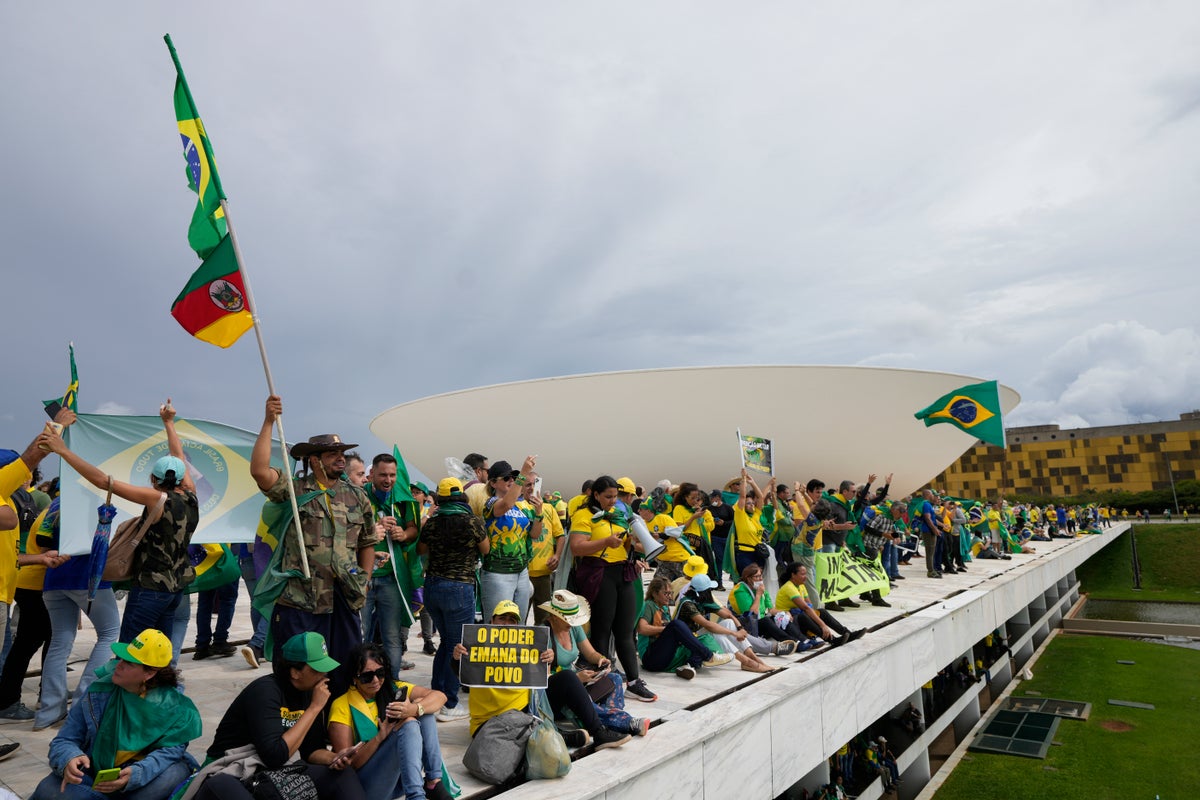
Over 400 people were arrested on Sunday after supporters of Brazil‘s former president Jair Bolsonaro broke through a blockade set up by security forces and invaded ministries and the Congress building in the capital Brasília on Sunday, in violence reminscent of the January 6 storming of the US capital in 2021.
“We continue working to identify all the others who participated in these terrorist acts this afternoon in the Federal District,” the governor of Brasília, Ibaneis Rocha, wrote on Twitter on Sunday evening. “We continue to work to restore order.”
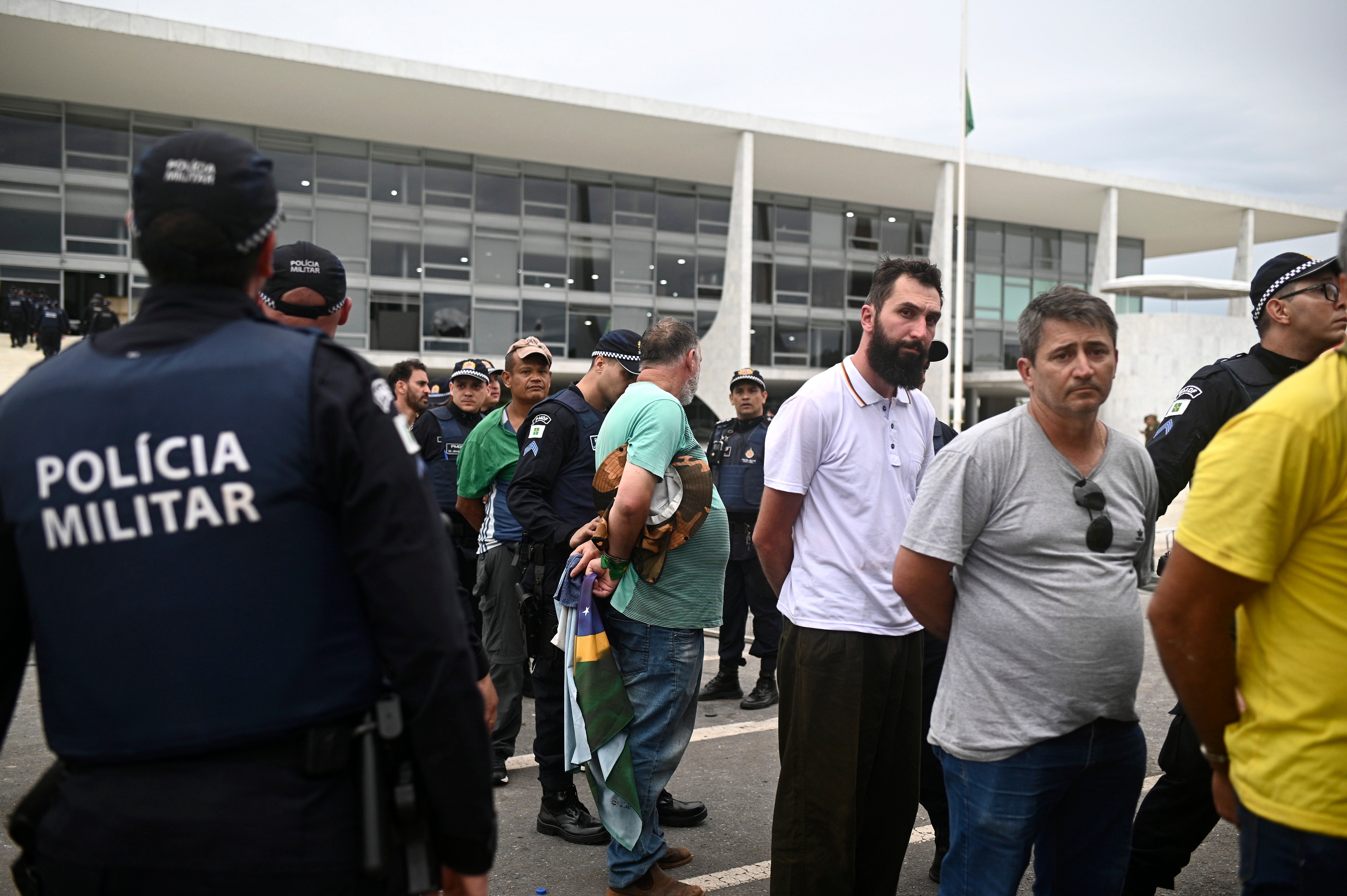
Video footage obtained by Reuters from Bolsonaro-related groups and video from local broadcasters show protesters storming multiple key federal buildings.
Police have reportedly regained control of the Supreme Court, the presidential palace and the national Congress, according to CNN Brazil.
Brazil’s newly inaugurated president Luiz Inacio Lula da Silva was on an official trip in Sao Paulo state during the violence, and lawmakers are on recess.
Lula, as he’s commonly known, condemned the attack as an unprecedented crime against Brazil’s democracy.
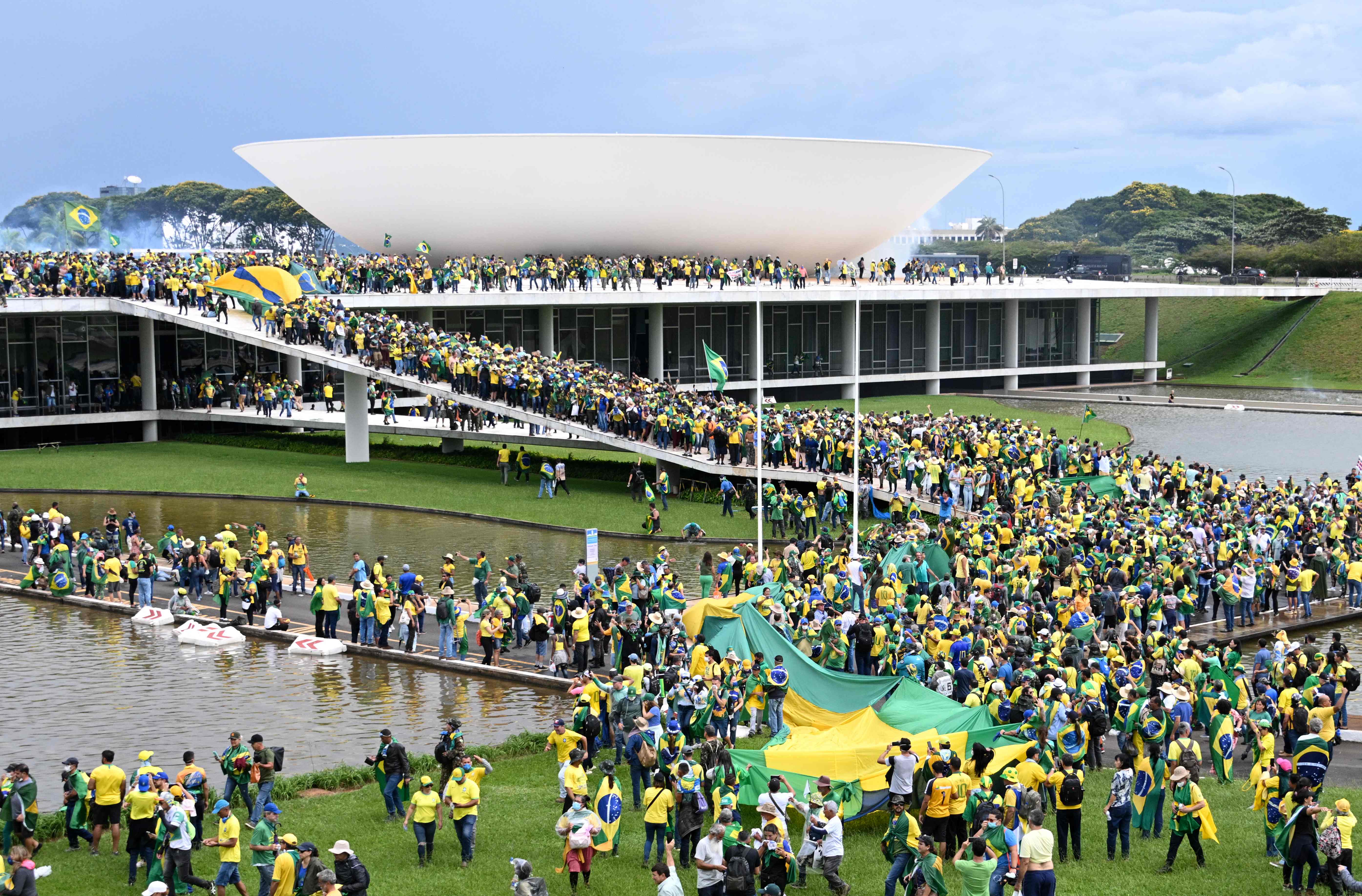
“These vandals, who we could call fanatical Nazis, fanatical Stalinists … fanatical fascists, did what has never been done in the history of this country,” he said in a press conference declaring a “federal security intervention” in the capital until the end of the month. “All these people who did this will be found and they will be punished.”
The group of rioters crossed a police barrier and climbed the ramp that gives access to the roof of the Chamber of Deputies and Senate buildings.
Protesters wearing yellow and green T-shirts and Brazilian flags attacked some police vehicles securing the building, the Spanish EFE news agency reported. They also destroyed protection barriers.
Footage shared on social media showed hundreds of people pouring into the building. The protesters were met with police tear gas.
Bolsonaristas could be seen posing for selfies in the congressional chamber, as well as ransacking various official buildings, Brazilian media outlet Metrópoles reported.
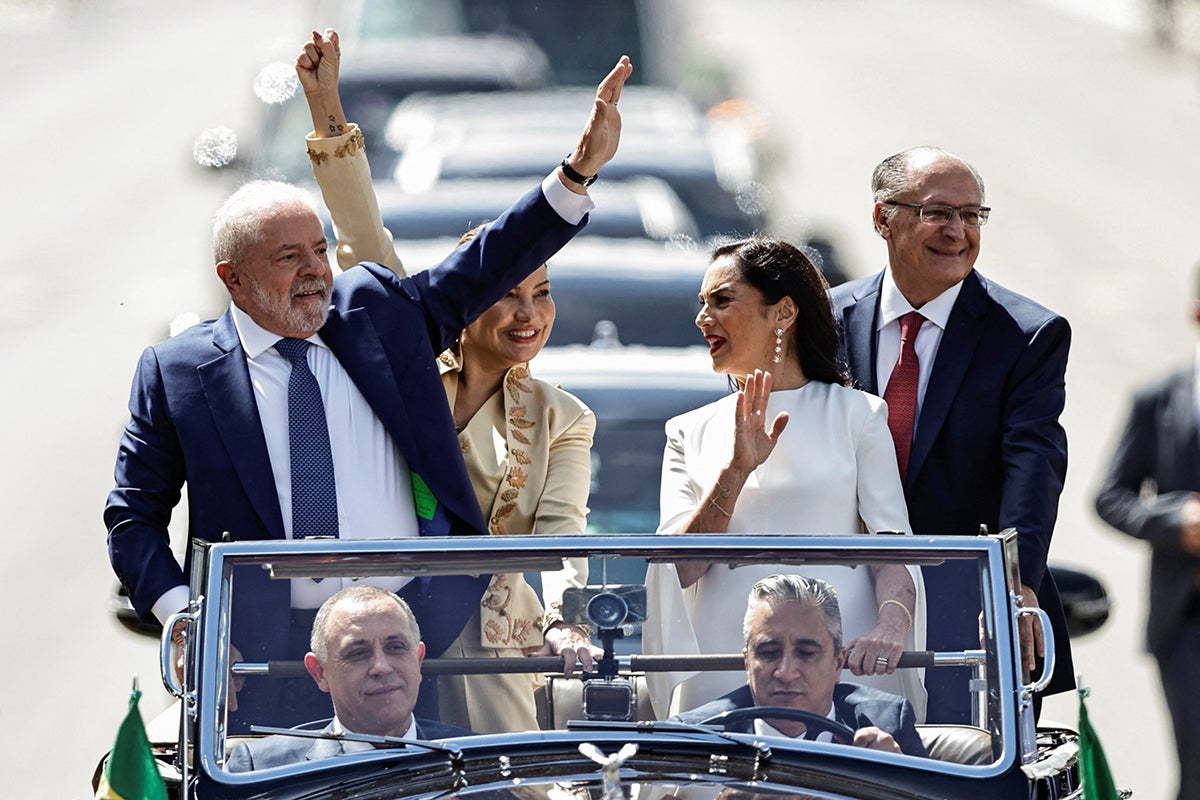
A Brazil-based reporter shared a video on Twitter purportedly showing the protesters storm the building.
Bolsonaro supporters have called on the military to help depose Lula.
“This absurd attempt to impose the will by force will not prevail,” Lula’s justice minister Flavio Dino wrote on Twitter.
Legislators and political observers were horrified by the storming of the heart of Brazilian politics.
“The National Congress is now being attacked by TERRORISTS!” Brazilian senator Randolfe Rodrigues wrote in a statement in Portuguese on Sunday. “Anti-democratic criminals cannot walk freely, there is nothing to tolerate with the intolerant. We expect the harsh application of the law to ALL those involved in these actions.”
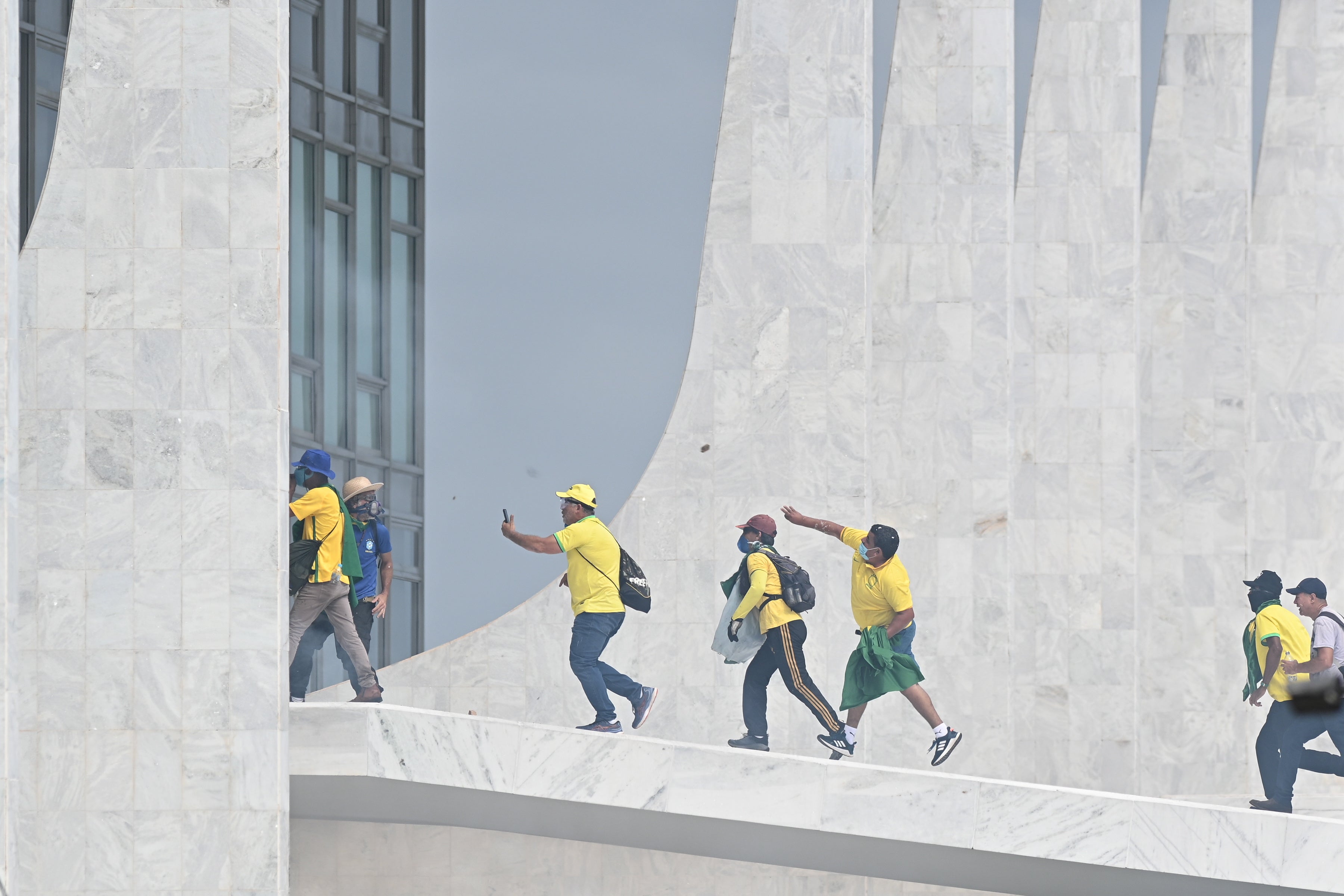
Lula ally André Janones called the rioters “terrorists” in a post on Twitter.
Anderson Torres, the former justice minister under Bolsonaro and current Federal District Security Secretary, said Sunday’s mob was “regrettable” and that he had ordered “immediate steps to restore order in the center of Brasília,” CNN reports.
Supporters of the far-right Bolsonaro have been protesting for months, refusing to accept the October loss at the polls to the longtime leftist leader.
Demonstrators have resorted to force and large-scale actions at times, lighting vehicles on fire, clashing with police, and blocking roadways.
Others have assembled outside of military buildings, calling on the armed forces to intervene and for Lula to resign.
Supporters of Bolsonaro camped out in groups near Brasília ahead of the riot, the BBC reports.
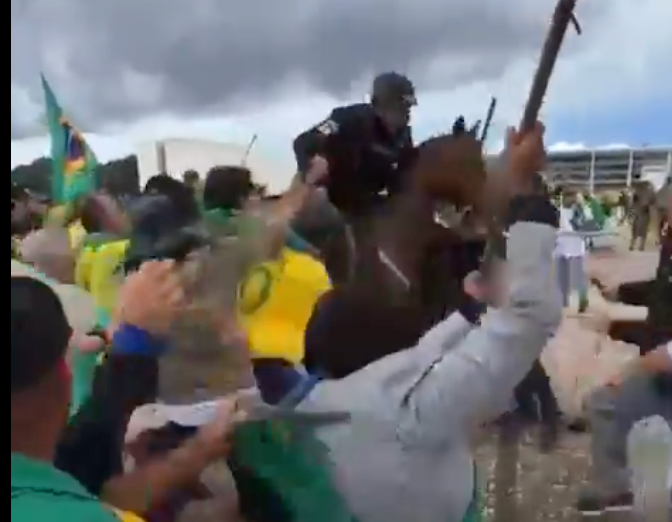
Bolsonaro bucked convention and declined to be present earlier this month to symbolically hand over the presidential sash to his successor, opting instead to decamp temporarily to Florida under a cloud of investigations and potential corruption charges.
The former Brazilian president could be seen wandering the streets near Orlando and eating at a Kentucky Fried Chicken fast food restaurant during Lula’s inauguration.
Observers have long warned that Bolsonaro was cultivating a Trump-like movement of diehard supporters, willing to engage in violence and mass disobedience to protest the election results.
The former president frequently made aggressive statements that he wouldn’t accept anything but an election win.
“There are only three alternatives for me: to be arrested, to be killed, or to be victorious,” he said at at 2022 rally. “And I tell those scumbags, I will never go to jail.”
That led critics to warn that Bolsonaro would use his popularity with the right wing and some members of the military to subvert democracy in a January 6-style attack.
Right-wing protestors have stormed and damaged multiple buildings in Brazil’s capital
“I’m very concerned by the effort of president Bolsonaro and his team to undermine the credibility of the institutions and the processes by which elections are conducted in Brazil,” former US ambassador to Brazil Thomas Shannon told The Guardian last summer. “For me that can only have one purpose, which is to try to prevent an election from happening or change their course or outcome.”
US Representative Jamie Raskin said both the storming of the US Capitol and Brasília are part of a larger, worrying right-wing trend.
“Democracies of the world must act fast to make clear there will be no support for right-wing insurrectionists storming the Brazilian Congress,” the Maryland Democrat wrote on Twitter on Sunday. “These fascists modeling themselves after Trump’s Jan. 6 rioters must end up in the same place: prison.”
The US government condemned the violence. National security adviser Jake Sullivan tweeted: “The United States condemns any effort to undermine democracy in Brazil. President Biden is following the situation closely and our support for Brazil’s democratic institutions is unwavering. Brazil’s democracy will not be shaken by violence.”
The storming of the capitol is a striking scene compared to the optimistic tone in Brasília just a week ago during Lula’s inauguration, where the president promised a new chapter in Brazil’s history.
“Under the winds of redemocratization, we used to say, ‘Dictatorship never again,’” he told a massive crowd. “Today, after the terrible challenge we’ve overcome, we must say, ‘Democracy forever.’”







